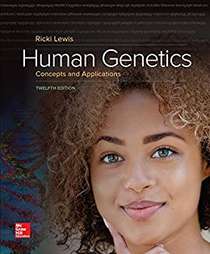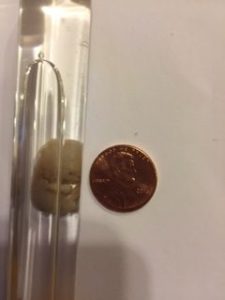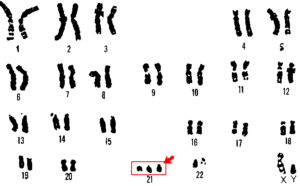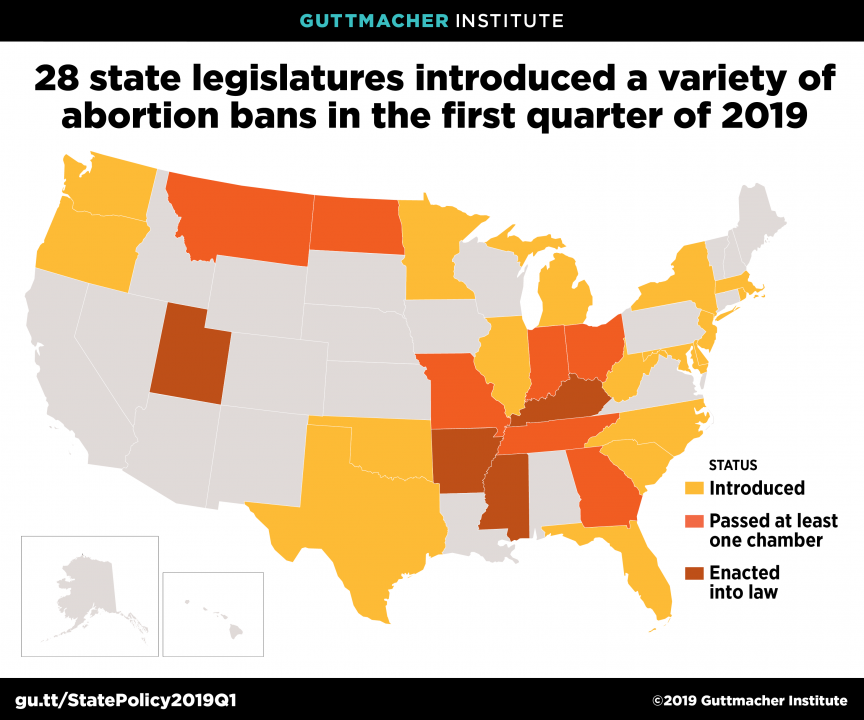Revising Textbook Coverage of Prenatal Diagnosis in an Anti-choice Climate
I’ve become a stalker.
When I recently stopped at an intersection behind a car with bumper stickers “Make Abortion Criminal Again” and “Worship GOD, not GOV,” I followed the offensive vehicle into the parking lot of Target. Out emerged an older white man who took no notice of me approaching, phone camera out.
I’m willing to bet that he never had to carry to term, in his body, a fetus known to have a severe chromosomal anomaly.
I’d bet that he was never forced to remain pregnant, give birth, and then watch the newborn die.
Yet the man in the Target lot, if those bumper stickers were indeed his, feels empowered to take the choice to abort this tragedy from women he doesn’t know.
But I thank him for the lead-in to this blog post.
What’s To Become of Prenatal Diagnosis?
 I’m revising my human genetics textbook for its 13th edition, and I’ve hit a roadblock at this sentence:
I’m revising my human genetics textbook for its 13th edition, and I’ve hit a roadblock at this sentence:
“If a test reveals that a fetus has a serious medical condition, the genetic counselor discusses possible outcomes, treatment plans, and the option of ending the pregnancy.”
I describe those prenatal tests in depth earlier, focusing on how testing fetal DNA in a woman’s circulation is replacing the riskier amniocentesis and CVS. But I now have to add “possible” before “option.”
Potential effects of more restrictive access to abortion on the prenatal diagnosis industry have been discussed for decades. Here’s a look at the situation in the UK in 1980, when a major issue was the long turnaround time for amnio. The new tests give results earlier.
Here in the US nearly 40 years later, the threat to reproductive freedom is beginning to feel like a runaway train. This report from the Guttmacher Institute summarizes the restrictions to abortion access for the first quarter of 2019, with the graphic at the end of the post. It’s even worse now.
Students reading my book who live in Utah, Missouri, Kentucky, Ohio, Arizona, Louisiana, Mississippi, Alabama, or Georgia may be in trouble should they not want to continue a pregnancy. Consider Louisiana.
On May 29, the state legislature approved 79 to 23, including 12 democrats, a bill to restrict access to abortion, even voting to block exceptions for rape or incest, supporting criminals over their victims. The governor approved it the next day. According to the Washington Post, the debate included lots of discussion of “beliefs” and “faith,” the good governor referring to his Catholic upbringing in defending why he has the right to force a woman to remain pregnant.
What I haven’t seen much of is discussion of the biology, something of which politicians seem especially ignorant (see When Does a Human Life Begin: 17 Timepoints). Just last night I received an email, from a man, who’d read my “17 timepoints” piece and informed me that 9 of 10 people are against late-term abortion. No one wants to abort a fetus that late – nearly all are done during the first or second trimesters. A third trimester abortion is performed only in cases of medical need, to save the life of the woman or if an early delivery might result in a live birth, but then doesn’t.
Another concept open to interpretation is the so-called “fetal heartbeat laws.” They typically refer to embryos, not fetuses. The period of the embryo ends at 8 weeks post-fertilization. Here’s a good high school level explanation.

The Fallacy of the Heartbeat Criterion
The Louisiana law is one of the “heartbeat” ones. The media trumpet 6 weeks as the time of detection of an embryo’s heartbeat, but that’s six weeks from the last menstrual period. According to biology, that’s four weeks from fertilization (conception), and the first detectable heartbeat is actually before the one-month mark. I’ve never understood why obstetricians tack on a meaningless two weeks to gestation, unless it’s a legacy of paternalism towards pregnant women, assuming they can’t fathom the details of human prenatal development. But to use the medical cutoff of six weeks instead of the more accurate biological one of four weeks masks a bit the draconian nature of these proclamations. It’s deceptive.
Why single out the heart?
Focus on the heart could be sentimental, but it likely has roots in the Uniform Determination of Death Act, which states that “An individual who has sustained either (1) irreversible cessation of circulatory and respiratory functions, or (2) irreversible cessation of all functions of the entire brain, including the brain stem, is dead.”
If a stopped heartbeat defines death, so the reasoning must go, then a beating heart must define life, even though a four-week human embryo could not survive outside a uterus. It’s the size of a lentil, according to this website that compares prenatal humans to fruits and vegetables, and calls embryos and fetuses “babies.” It’s this cavalier, imprecise, unscientific lingo that intensifies the debate and ultimately denies women choice.
I get that an embryo’s heartbeat is quick, easy, and safe to detect in a provider’s office, unlike the activities of other vital organs like a liver, brain, or kidney. But is a heartbeat a valid proxy for health in all circumstances, or merely a convenient marker, a fast test to deny abortion?

The heart in fact continues to beat in some horrific conditions, like those in which each cell has an extra chromosome. Most such pregnancies end naturally after a few weeks, but fetuses with trisomy 13 or 18 can survive a few days or weeks after birth. Even though the heart beats, other problems ensue: cleft lip and/or palate, small heads or other body parts, extra fingers and toes, poor muscle tone, and abnormalities of the brain and spinal cord.
Only five to ten percent see their first birthdays, and by then, the severe intellectual disability is apparent. I had friends who had an affected child who lived a few months, their older child bonding to her. The woman didn’t hesitate to have amniocentesis with the next pregnancy – she would not have chosen to repeat the tragedy to full term. A trisomy 13 or 18 fetus is one of the saddest situations a genetic counselor can encounter. But a very few individuals with either trisomy live a few years, like Bella Santorum, who recently turned 11. I wrote about a 21-year-old with trisomy 18 here. He weighed 55 pounds.
I’m not anti-special-needs-children. They are here. They are people, with rights. But it is my opinion that ending such a pregnancy should be an option for a woman, with input from the man, guided by a health care professional familiar with the condition. President Trump, meanwhile, repeats the falsehood that such newborns are ripped apart at birth, like clubbing baby seals. And of course people believe him.
When an Inherited Disease Recurs
Trisomies are a surprise, found on a prenatal test or at birth. But statistically recurrence risk for a future pregnancy is elevated, to about 1 in 100.
Parents of a child with a single-gene condition face another situation: a possible repeat in a younger sibling with a chance of 1 in 4 if it’s recessive. (A dominant condition would also be in a parent or originate anew in the affected child, and therefore not affect a future pregnancy.) A recessive disease repeating in such a family would be detectable prenatally because the lab would know which gene to test.
From my textbook:
“Counseling for subsequent pregnancies requires great sensitivity. Some people will not terminate a pregnancy when the fetus has a condition that already affects their living child, yet some people will see that as the best option. The severity of an illness and available treatments may be important in how people feel about options. Genetic counselors must respect these feelings and tailor the discussion accordingly, while still presenting all the facts and choices.”

Facts and choices.
I may have to whitewash my words for the new textbook edition, writing only that genetic counselors explain medical choices, without identifying the choices because not all women will have them. Sad.
The bigger picture that it isn’t clear, amid the bellowing about beliefs, is who will bear the increased economic costs of care that will surely follow the denial of the choice to end a pregnancy, for any reason? Perhaps I should ask the man with the bumper sticker “Worship GOD, not GOV.” I have his license plate number.
But biological arguments do not matter, for in the current political climate, the abortion issue isn’t about biology. It’s about power and control.
The new season of “Handmaid’s Tale” dropped yesterday. Welcome to Gilead.


Thank you for laying out the facts. This a scary new world we’re in. Anti-choice folks have been brainwashed by the Republican Party & they made this an issue to get votes. Abortion has nothing to do w/ religion, it’s a healthcare option & choice that only a woman can make.
I agree, religion shouldn’t have anything to do with a woman’s personal choice to have a medical procedure, but it seems to me to be the common denominator amongst many of the anti-choice folks who think that their personal religious faith gives them the right to dictate to women what they can do with their own bodies. Scary times indeed … it is amazing to me how the news about this almost always leaves out embryonic/fetal anomalies and the choice to end a pregnancy. Thanks for posting!
Good article with one correction. Third trimester terminations do indeed happen for medical reasons, although not as commonly.
Yes, thank you Susan, this occurred to me after I posted.